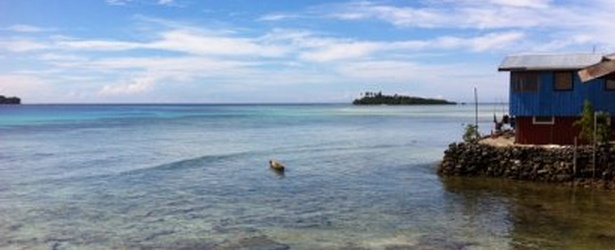Pacific Islands capital to be relocated due to coastal hazards and climate change

Taro, the capital of Solomon Island's Choiseul Province, is getting relocated to the mainland due to coastal hazards and the risk of rising sea levels resulting from climate change. This marks the first time a Pacific Islands capital with all its services and facilities would be relocated due to coastal hazards and climate change.
The University of Queensland worked with British Maritime Technologies WBM (BMT WBM) and Buckley Vann town planners to develop a comprehensive climate change adaptation plan to move the town of Taro to the adjacent mainland.
“As the capital of the Choiseul Province, Taro is less than two meters above sea level, presenting a significant risk to the community, which will be compounded in the future with climate change and the resulting rise in sea levels,” UQ School of Civil Engineering’s Professor Tom Baldock said. He added that the the community of Taro was also under significant risk from tsunamis and ocean storms.
“Relocation is the only option available that will keep the community safe and will allow for future growth and prosperity of the capital and the province,” BMT WBM lead Project Manager Dr Philip Haines said.
The relocation of the capital, including schools, hospitals and businesses, will take many decades to complete, and the adaptation plan also aims to increase the community’s resilience to coastal hazards, such as the preparation of a tsunami response plan.
A multi-disciplinary team of engineers, scientists and town planners consulted extensively with the Choiseul Bay communities to develop a vision and future town layout that reflected the needs and values of the local Lauru people.
UQ’s Dr Simon Albert led the community consultation and developed a management plan taking account of traditional practices and expertise.
The project is now being hailed by the Solomon Islands National Government as a best-practice model for natural hazard resilience planning for other provinces across the Solomon Islands and more broadly across the Pacific region.
Source: The University of Queensland

There IS NO evidence of rising sea levels. This might be because the whole man-made global warming story is a hoax.
“As the capital of the Choiseul Province, Taro is less than two meters above sea level, presenting a significant risk to the community, which will be compounded in the future with climate change and the resulting rise in sea levels,” UQ School of Civil Engineering’s Professor Tom Baldock said.
FYI
I wonder how this statement by Prof. Baldock, "compounded in the future with climate change and the resulting rise in sea levels" is qualified.
The records of 12 Pacific Islands sites, including the Solomons show little or any rise in sea levels from 1993 to 2010. Of course there may be future subsidence, unrelated to climate change at Taro.
See link here: http://joannenova.com.au/2010/08/south-pacific-sea-levels-no-rise-since-1993/
Thanks!